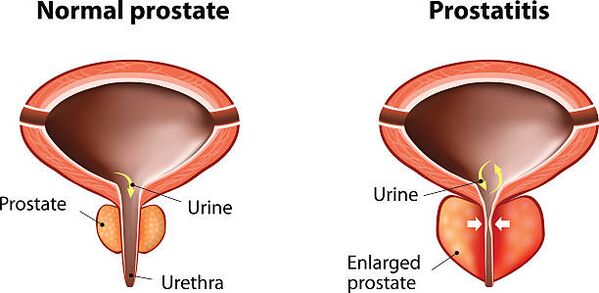Prostatitis is an inflammatory process that develops in the glandular tissue of the prostate, sometimes transitioning to the muscle part of the organ. This can cause perineal pain, weakness, fatigue, urinary dysfunction, and sexual dysfunction. In order to avoid the dangerous complications of this disease, acute prostatitis must be treated.

At present, the etiology and process of prostatitis are well known. Therefore, urologists have a wide range of tools to treat this disease. They can only be prescribed by an expert who understands which part of the disease development process is affected by a particular drug and takes into account the contraindications. The main group of drugs considered for the treatment of prostatitis.
Antibacterial agents
The most common cause of prostatitis is bacteria. Antibacterial drugs are directed against them.
In order to target the bacteria that cause prostatitis in a specific person, it is necessary to conduct bacteriological studies on the secretions secreted by the prostate. Only after knowing the name of the microorganism, its characteristics, and which antibacterial agents it is sensitive to, can you choose the appropriate antibiotic. Modern drugs in similar directions can even cure serious diseases. In acute bacterial prostatitis, the following antibiotics are used:
- Amoxicillin;
- Ceftriaxone;
- Cefotaxime;
- Ofloxacin;
- Ciprofloxacin;
- Azithromycin.
This is not a complete list of antibacterial drugs used to treat prostatitis.
Antiviral therapy
If prostatitis has herpes etiology, treat it with antiviral drugs. it:
- Acyclovir
- Valacyclovir;
- Faciclovir.
The latter drug is the "gold standard" for the treatment of viral prostatitis.
Non-steroidal anti-inflammatory drugs
Medications such as diclofenac, indomethacin, ketoprofen or ketorolac are not used to eliminate the pain associated with this disease, but to reduce the swelling and inflammation of the glands. They also contribute to the appearance of substances in the blood that promote the manifestations of poisoning and reduce the rise in body temperature.
The best medicine to fight inflammation is diclofenac, which can also eliminate pain syndromes well. If the pain is particularly severe and severe, use ketorolac.
Medications to eliminate spasms
In the treatment of prostatitis, the drugs used act on various key points of pelvic and prostate muscle spasms. This will allow you to improve urination and help eliminate pain from the previous group of medications. So, they apply here:
- Drotaverine: It acts on smooth muscles, making it impossible to react and causing muscle spasms;
- Baclofen: reduces the sensitivity of nerve fibers from the prostate and toxic organs;
- Tamsulosin: only acts on the receptors in the bladder and prostate muscles.
Auxiliary drugs
A good supplement for the treatment of prostatitis is the following drugs:
- Prostate extract: This drug can protect prostate cells from damage during inflammation, improve microcirculation, eliminate congestion of small pelvic blood vessels, and strengthen blood vessels. All these effects are extremely beneficial to chronic prostatitis. Having an animal, not a chemical source, will not cause side effects. It can be used in the form of injections or suppositories.
- Palm creeping fruit extract. It is a herbal medicine with powerful anti-inflammatory effects. It can also regulate urination volume and urinary force, and reduce the discomfort symptoms that appear when going to the toilet.
- Food bioactive supplements, containing protein and nucleoprotein complexes isolated from the prostate of cattle, can affect the metabolism of the prostate, normalize its work, and thereby normalize urination.
























